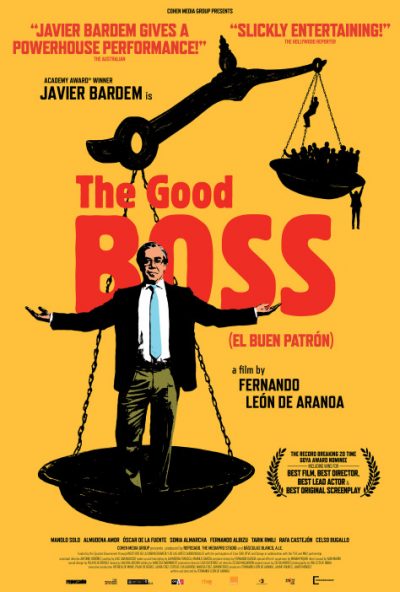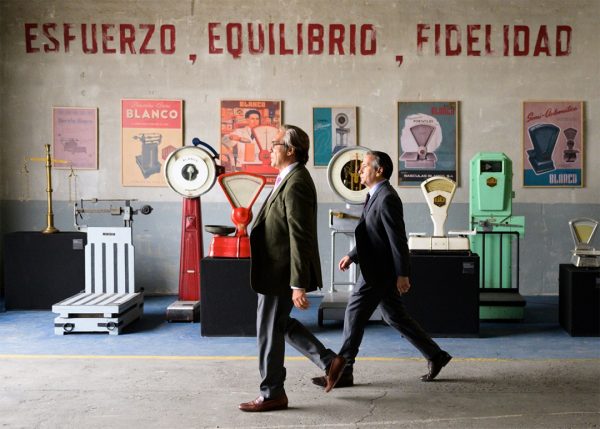
“The Good Boss” (“El buen patrón”) (2021 production, 2022 release). Cast: Javier Bardem, Manolo Solo, Almudena Amor, Óscar de la Fuente, Sonia Almarcha, Fernando Albizu, Tarik Rmili, Rafa Castejón, Celso Bugalla, Martín Páez, Mara Guil, Yael Belicha, Nao Albet, Francesc Orella, Daniel Chamarro, María de Nati, Eva Rubio, Dalit Streett Tejeda, Nicolás Ruiz. Director: Fernando León de Aranoa. Screenplay: Fernando León de Aranoa. Web site. Trailer.
For Julio Blanco (Javier Bardem), image is everything. As the owner of Basculas Blanco, a Spanish manufacturer of precision industrial scales that has been in his family for years, he oversees an operation that he views as one big happy family. He’s the proud “parent” of a staff of “children” whose welfare he cares about deeply (or at least so he says, particularly if he can milk good publicity mileage out of such claims and resulting impressions).
In looking after the well-being of his employees, Blanco gets involved – really involved – in their affairs, be they personal or work-related. But what some might view as concern others are likely to see as meddling – and intrusively so. He tries to come across as profoundly well meaning when, in fact, much of what he does is aimed at trying to preserve the image he has so carefully crafted for the company, an appearance that he hopes will translate into good PR for the business.
That’s especially important to him now that Basculas Blanco has been named one of three finalists in the running for a prestigious regional business award. As a company that has won many such honors over the years, Blanco wants to do everything he can to capture this latest prize. And, to help ensure that, he’s fixated on creating the proper public impression for the operation, one that he believes is essential to winning over the judges. So, in addition to giving his usual highly visible pep talks to the staff and courting favorable media coverage, he also ramps up his efforts to see that his employees’ needs are attended to – and that anything potentially damaging to the firm’s reputation be squelched, regardless of whether those issues are of a public or private nature.
In the run-up to the judges’ evaluation visit to the company’s headquarters, several employee-related matters arise that Blanco tries to tamp down before they grow into full-blown crises. In the week leading up to the judges’ appraisal, Blanco finds himself intervening in the following scenarios:

- Blanco’s childhood friend and longtime production manager, Miralles (Manolo Solo), has been fouling up repeatedly of late, creating major problems for the assembly and delivery of product to the company’s customers. He promises to get better, but the situation doesn’t improve, so Blanco decides to get involved. When questioning his compadre and colleague, he learns that Miralles has become seriously distracted. He believes that his wife, Aurora (Mara Guil), is having an affair, and this suspicion is affecting his job performance. Blanco thus teams up with
- Miralles in setting up an undercover spying operation to discover the truth and even goes so far as to visit Aurora at her job to talk to her about her husband’s hunch, a decision that doesn’t go over well with her. It also unearths some additional revelations that further complicate the situation, making Blanco’s involvement even more problematic, both in his attempts to resolve the issue and in the nature of his relationship with his old friend and associate.
- Meanwhile, Miralles’s work performance issues are having a ripple effect in other parts of the operation, most notably those supervised by one of the floor managers, Khaled (Tarik Rmili), one of Blanco’s immigrant employees. The mistakes are causing growing friction between the two staffers, especially when Miralles imposes himself on Khaled’s efforts at correcting his colleague’s errors. At this point, however, little does Miralles understand just how strained his relations with Tarik are about to become.
- One of Blanco’s long-tenured employees, Fortuna (Celso Bugalla), has got a problem. His son, Salva (Martín Páez), has become mixed up with an unsavory crowd, placing his safety and well-being in jeopardy. As someone who often does odd jobs and personal favors for Blanco, Fortuna turns to him for help with Salva, asking him if there’s anything he can do to help protect the young man from further harm. To avoid drawing undue attention to the matter (and to his business), Blanco steps in and agrees to help Fortuna, securing a job for Salva as a delivery man at the designer clothing shop run by his own wife, Adela (Sonia Almarcha). She’s not particularly thrilled, given her skepticism about the character of the unexpected new hire (for a position she didn’t even have open), but Blanco smooths over issues with her and gets Salva employed, despite her reservations. How that arrangement turns out remains to be seen.
- It’s never easy letting go of an employee, but Blanco tries to make the process as painless as possible. Unfortunately, that’s not the case with the dismissal of one of the members of Blanco’s accounting staff, José (Óscar de la Fuente). He’s distraught when he gets the news, because it’s an added burden to his already-strained domestic situation. But, since José is no longer part of the “family,” Blanco feels his former employee is no longer his responsibility. This outlook backfires on the boss, especially when José refuses to go quietly. He sets up a makeshift encampment on a piece of property across the road from the factory, where he relentlessly heckles his former employer with a bullhorn and a colorful assortment of homemade derogatory placards, frequently with his two young children (Nicolás Ruiz, Eva Rubio) in tow. Blanco tries to have authorities remove the protestor, but, since he’s encamped on land not owned by the company, there’s little they can do. Blanco also appeals to his front gate security guard, Román (Fernando Albizu), for assistance, but the buffoonish lout often ends up unwittingly siding with the picketer, often for ridiculous reasons. This is obviously an intolerable situation that won’t go away on its own (and one that Blanco can’t bear for the judges to see), so it soon becomes apparent that more drastic measures are necessary to resolve matters. But will they truly resolve things?
- In an effort to help new arrivals feel comfortable on the job, Blanco often takes a personal interest in making them feel welcome. That’s especially true with the female interns (particularly those who are young, attractive and eager to make a name for themselves in the company). It’s apparently a long-standing practice with Blanco, one that’s been revived yet again with the arrival of Liliana (Almudena Amor), a new staffer in the marketing department. Blanco’s interest quickly goes beyond just being a good boss. But his personal touch this time carries unforeseen consequences that have serious ramifications, particularly if he wants to avoid making waves that could cost the company its coveted award. Indeed, if one truly wants to be a good boss, it’s best to keep one’s hand out of the cookie jar.
And, with all that in place, Blanco now has a plate that’s become fuller than he probably ever envisioned. Can he pull everything out of the fire successfully and in time? If so, will he be able to avoid any embarrassing or inconvenient fallout? And will he win the award he so craves? He’ll need to be a really good boss if he hopes that all of that will happen.

That approach is borne out of Blanco’s beliefs, what he draws from in manifesting the existence he experiences. This is the product of the conscious creation process, the philosophy that maintains this is how our reality comes into being, a direct reflection of what each of us believes deep down inside. However, to bring about what we want – or what we think we want – we need to have a good handle on exactly what those beliefs are. If our assessment is off or if we try to fudge our beliefs to manipulate our reality into existence, we’re potentially setting ourselves up for trouble.
This is where the importance of integrity comes into play. In many regards, integrity is a core belief, one upon which all of our other intentions rest. If this component is missing or “adjusted” to meet certain ends, the beliefs that depend on it for their fulfillment have the potential to become comparably compromised, putting the materialization of our hoped-for creations in jeopardy. Indeed, if we want our beliefs to bear fruit as intended, we must have an unfettered sense of personal integrity in place, both where we and others are concerned. To do less is playing a loaded game of roulette, something that Blanco must contend with as his story unfolds.
Blanco gets himself into trouble here by blindly doing whatever he believes is necessary to achieve the outcome he desires. On the surface, that may sound ambitious, even admirable. However, when carrying out that mission involves veering into questionable territory, the possibility of encountering unexpected consequences or side effects enters the picture, potentially growing ever more problematic the more he detours from an integrity-based course. And, try as he might to set things right by coming up with increasingly jerry-rigged solutions, the further he strays from staying on track. In a bid to win the award he so ravenously covets, he continually sinks further into a morass of metaphysical quicksand from which escape grows ever less likely.
If you doubt that, consider the fallout that emerges out of each of the aforementioned scenarios: His relationship with Miralles suffers, potentially undoing personal and professional connections that have taken a lifetime to forge; once-harmonious working relationships on the floor of the Blanco plant deteriorate, creating chaos in a business whose inherent mission is achieving precision; interfering in Adela’s boutique strains his marriage and potentially undermines the operations of her business; and efforts aimed at silencing a disgruntled employee get ever more out of hand, leading to “solutions” with wider and more serious consequences. Then there’s Blanco’s self-serving personal ambitions with Liliana, acts of self-sabotage with the potential to ruin his life on so many fronts; it’s a venture he foolishly believes he can get away with free of complications as long as he applies enough finesse and tends to her needs. Where is the integrity in any of that?
The upshot of all this is that Blanco’s in line for a hefty dose of comeuppance, even if, ironically enough, he stands to get his way. Acts of un-conscious creation or creation by default like these don’t automatically cancel out achieving our goal, but that doesn’t mean they don’t come with all sorts of qualifications or caveats. This, however, may be almost as problematic (if not more so) than not getting what we want. We should consider that as we move forward with our plans as well. As the old saying goes, sometimes getting what we want is just as bad as not getting what we want.

It should also be noted that the foregoing notions are not only applicable to individuals like Blanco, but also to organizations. In that sense, then, “The Good Boss” is as much a satirical treatise about the ways of the business world as it is about the buffoonery of a specific CEO. Companies may be collective entities, but their operations are governed by individuals who work together in agreement to achieve certain goals, all of which are, again, belief-based. And, like people, they’re just as capable of carrying out their initiatives in the same way as individuals do once they reach consensus on their intents. This includes bending the rules on their sense of integrity when they believe it best suits them in fulfilling their objectives. Given the power that these entities wield, the implications of such ventures can be far more wide-reaching, too, potentially having seriously negative consequences for a broad range of affected parties. This narrative thus serves up a powerful cautionary tale, not just to those implementing these measures, but also to those who could be impacted by them once in place.
It's ironic, too, that this all takes place in a company that manufactures scales, devices whose innate intent is to achieve balance. From what’s going on here, balance is a trait that’s notably lacking, just as it is in many businesses, regardless of what they make or what service they provide. While some might say this aspect of the narrative is a little too on the nose, it nevertheless helps to drive home the point of the film. We can only hope that the business world and those who make its decisions are paying attention if they know what’s good for them – and us.
It might appear comforting that there are still companies out there that genuinely care about the welfare of their employees, treating them like members of a big, loving family. But we must also be on guard that looks can be deceiving in this regard, both to us and to those in the driver’s seat. Writer-director Fernando León de Aranoa’s latest serves up a biting satire about the business world and the extremes to which companies will go to present squeaky clean, politically correct portraits of themselves to an easily gullible public, tactfully burying the compromises and questionable tactics they often must employ in realizing that goal. This offering is a perfect vehicle for Javier Bardem as the oily protagonist, playing the part with just the right amount of insincerity to be convincing without looking cartoonish, in a role backed by a superb ensemble of supporting characters. It’s regrettable that the picture gets off to a painfully slow start during much of the first hour, but the film more than makes up for this shortcoming in the second half, turning wickedly funny and occasionally disquieting in the end run. Be patient with this one, giving it ample time to develop; you won’t be disappointed with the payoff.
“The Good Boss” has been showered with honors and nominations at film festivals and in early awards season competitions thus far, achieving 30 wins on 50 nominations, many of them for Bardem’s outstanding lead performance. Look for more to follow as awards season heats up. Catch the film in theaters, where it’s currently playing, while you have the chance.
Copyright © 2022, by Brent Marchant. All rights reserved.

No comments:
Post a Comment